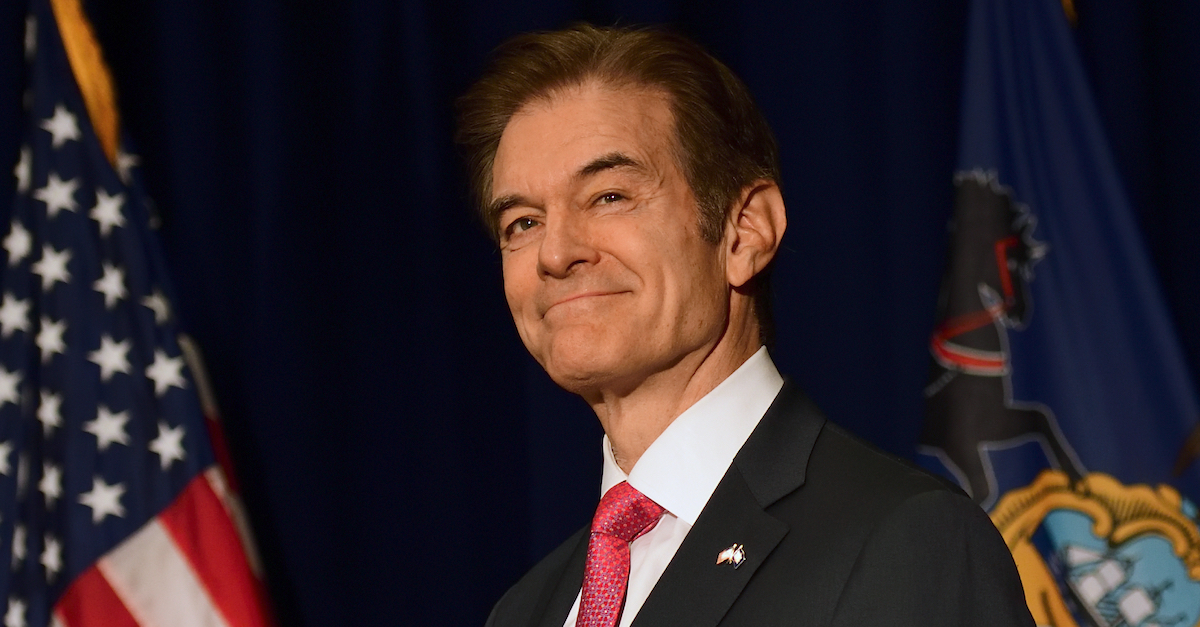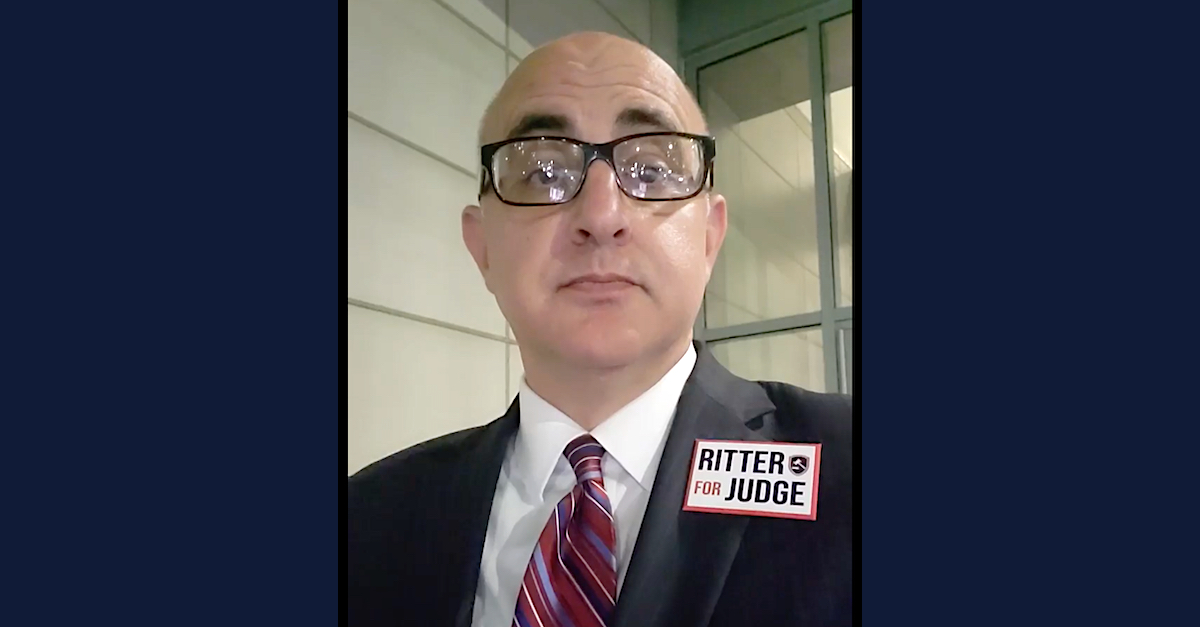
Republican U.S. Senate candidate Dr. Mehmet Oz was photographed at a press conference on Sept. 6, 2022 in Philadelphia. (Photo by Mark Makela/Getty Images.)
The U.S. Supreme Court has rubbished as moot a lawsuit from a former Republican candidate for judicial office in Pennsylvania. The legal process attached to the case has wiped away a Third Circuit Court of Appeals decision that allowed local elections boards to count vote-by-mail ballots that did not contain voter-provided dates.
The case, styled as Ritter v. Migliori, questioned whether the Third Circuit properly trounced Pennsylvania election law to allow such counts to be conducted.
David Ritter, a Republican candidate for the Lehigh County Court of Common Pleas, filed the case against a collection of defendants, including Linda Migliori, to contest a move by the Lehigh County Board of Elections to count 257 ballots. The board voted unanimously in November 2021 to “to count the ballots” in question, court papers say, which were “cast by Republicans and Democrats alike” and “which all parties agree: (1) were timely received and date-stamped by election officials, (2) were cast by eligible, registered voters, whose qualifications were verified by the Board, and (3) do not implicate any fraud concerns.” However, the board took no official position in Ritter’s appeal.
Or so the Board of Elections indicated. Ritter cast the matter another way.
“The Pennsylvania Supreme Court has not been shy about overriding the State’s democratically enacted election laws,” Ritter indicated in a petition to U.S. Supreme Court Justice Samuel Alito dated May 27, 2022. The petition was addressed to Alito because he is the justice who handles incoming matters from the Third Circuit Court of Appeals. That appeals court covers Pennsylvania.
Ritter’s grievance involved both the lack of dates on ballots and the legal history of who should order whether or not the ballots should be counted.
“Though a majority of the Pennsylvania Supreme Court suspended the dating requirement in 2020, a different majority held that undated ballots would not be counted in future elections,” he asserted. “Sure enough, when Lehigh County decided to count undated ballots in a 2021 election, the Pennsylvania courts ordered it to stop.”

David Ritter. (Image via Facebook video screengrab.)
Then the Third Circuit Court of Appeals stepped in, according to Ritter’s petition (we’ve omitted the legal citations):
Yet the Third Circuit has now gone where even the Pennsylvania Supreme Court wouldn’t. For that same 2021 election, the Third Circuit has ordered Lehigh County to count over 250 undated ballots—enough to eliminate David Ritter’s lead three times over. Its decision adopts a novel interpretation of an obscure federal statute that would let federal courts set aside any state election law that they deem “immaterial.” It splits with the Pennsylvania courts’ interpretation of that same federal statute in this same election. And it orders Lehigh County to do what the state courts ordered it not to do. It also changes the rules after the election ended, in favor of five voters who inexplicably waited months to file a follow-on federal suit. And it risks changing the outcome not only in Ritter’s election, but also in ongoing contests over Pennsylvania’s just-completed primaries and the general election in November.
Ritter continued:
The question in this case is whether Pennsylvania’s law requiring voters to date their mail-in ballots violates federal law. If it does not, then Ritter wins a seat on the Lehigh County Court of Common Pleas. If it does, then Lehigh County must count 257 undated ballots, likely erasing Ritter’s 71-vote lead. Ritter already won this issue in state court—the normal avenue for settling post-election disputes between candidates. But when individual voters raised the same question in a later federal suit, the Third Circuit ruled against Ritter. The Third Circuit then declined to stay its decision pending certiorari, requiring this emergency application.
Alito stayed the Third Circuit’s order on May 31, 2022, but the full U.S. Supreme Court reversed the stay on June 9 and allowed the Third Circuit’s ruling against Ritter to stand. Justices Neil Gorsuch and Clarence Thomas joined Alito by indicating they would have continued the stay.
“The Third Circuit’s interpretation broke new ground, and at this juncture, it appears to me that that interpretation is very likely wrong,” Alito wrote in June. “If left undisturbed, it could well affect the outcome of the fall elections, and it would be far better for us to address that interpretation before, rather than after, it has that effect. I would therefore enter a stay pending certiorari and advise that any petition for certiorari and brief in opposition should be filed expeditiously. If that is done, the Court will be in a position to grant review, set an expedited briefing schedule, and if necessary, set the case for argument in October.”
With the legal issues outstanding, Ritter conceded, according to a June 21 report by The Morning Call, an Allentown, Pennsylvania-based newspaper.
“There will be no recount, nor any objections to the certification of this election,” Ritter reportedly said. “I remain disappointed in the way the legal issues were resolved, and I used every available tool to defend my rights and the rights of those who voted for me. But now a 10th Judge must be seated on the bench. As both a resident and a 25-year employee of Lehigh County, I believe that the citizens, courthouse employees, and nine sitting Judges all deserve to have a full contingent of Judges in place.
“For the good of Lehigh County, this election must be concluded,” he reportedly added.
That act basically rendered the case moot, but the various respondents — the election officials in question — argued that Ritter’s concession statements triggered an exception to the mootness doctrine. Ritter asked the Supreme Court to vacate the Third Circuit’s ruling and to render the case moot. The issue, again, was whether the Third Circuit could force the ballots to be counted despite what the state courts said.
The Supreme Court on Tuesday agreed with that rationale.
“The judgment is vacated, and the case is remanded to the United States Court of Appeals for the Third Circuit with instructions to dismiss the case as moot,” the U.S. Supreme Court wrote in a short summary disposition.
Justices Sonia Sotomayor and Ketanji Brown Jackson said they would have denied the petition without vacating the Third Circuit’s ruling.
While ultimately shutting down the Third Circuit’s interpretation of the matter without a full on-the-record hearing, the high court did allow several amicus curiae parties — including Bryan Cutler, the Republican Speaker of the Pennsylvania House of Representatives, and Doctor Oz for Senate, the campaign arm of Mehmet Oz — to file arguments in the matter.
Cutler’s amicus brief was joined by Kerry Benninghoff, the Majority Leader of the Pennsylvania House of Representatives; Jake Corman, the President Pro Tempore of the Pennsylvania Senate; and Kim Ward, the Majority Leader of the Pennsylvania Senate. All are Republicans, and all agreed that the Third Circuit’s decision should be vacated pursuant to United States v. Munsingwear, Inc., 340 U.S. 36 (1950).
Munsingwear held that when a case becomes moot while moving through the federal court system, the U.S. Supreme Court’s “established practice . . . is to reverse or vacate the judgment below and remand with a direction to dismiss.”
The politicians’ arguments, when cut closer to the merits, went like this:
The Third Circuit’s decision has upended carefully constructed election administration procedures – procedures that were previously upheld by Pennsylvania state courts and the United States District Court. Should the decision be left in place, it is unclear how Pennsylvania will be able to conduct an orderly election in November – especially when by the letter of the decision of the court below, any regulation of vote by mail would be deemed “immaterial” should it not directly relate to voter eligibility.
The Third Circuit’s decision invalidating those voteby-mail procedures also triggers the non-severability clause of the legislation that created no-excuse mail-in voting in the first place, thereby calling into question whether no-excuse mail-in voting will be a part of Pennsylvania elections going forward.
Dr. Oz’s campaign filed an Amicus brief on May 30 to skewer his opponent in the Republican primary for U.S. Senate in that state:
Amicus Doctor Oz for Senate is the principal campaign committee for Amicus Dr. Mehmet Oz, who is currently leading by 922 votes in the May 17, 2022 primary election to serve as the Republican candidate to represent Pennsylvania in the United States Senate. The Third Circuit panel’s judgment in this case issued on May 20, 2022, three days after voting in the primary election was completed. Yet Dr. Oz’s principal competitor, David McCormick, has invoked the panel’s judgment in a Hail-Mary effort to overturn the apparent result of that election. In particular, Mr. McCormick has asked the Pennsylvania courts to change the rules of the primary election after voting has been completed, to overrule their prior precedent, and to order election officials to count mail-in and absentee ballots that lack a voter-completed date and, thus, are invalid under Pennsylvania law. The Acting Secretary of the Commonwealth has likewise invoked the Third Circuit’s reasoning to request an order requiring election officials to count undated mail-in and absentee ballots.
Dr. Oz’s brief said it “fully support[ed]” Ritter’s “request for a stay of the Third Circuit’s decision.”
The brief continued:
Amici Doctor Oz for Senate and Dr. Mehmet Oz support and seek to uphold the will of Pennsylvania’s voters, Pennsylvania’s free and fair elections, and the General Assembly’s duly enacted laws governing those elections. Unfortunately, the Third Circuit’s thinly reasoned and erroneous decision — which addressed a county judicial election conducted more than six months ago — is now being weaponized to undermine the apparent result of a statewide primary election for the Republican nomination to represent Pennsylvania in the United States Senate. The public interest strongly favors issuing a stay in this case to prevent the Third Circuit’s decision from eroding public confidence, disrupting “the functioning of our participatory democracy,” and creating “voter confusion and consequent incentive to remain away from the polls” in Pennsylvania’s 2022 elections.
The upshot is this: the Third Circuit’s rationale is no longer applicable law, but it could rear its head again in another case. Accordingly, Pennsylvania voters who wish to have their votes counted should fill out their ballots properly because the Third Circuit’s curative stance to the issue is no longer officially on the books.